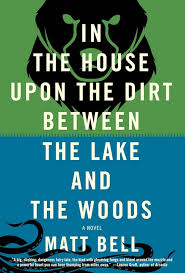
|
If you were to read all the words in Matt Bell’s debut novel In the House upon the Dirt Between the Lake and the Woods, it would probably take between three or four hours. To read the book, the story on the pages, will take you considerably longer. When I first discovered Matt Bell and learned of his upcoming novel, I pronounced the title over and over in my head with the same staccato rhythm. I told friends about “In the house / upon the Dirt / between the Lake and the Woods,” but after reading the story and digesting the prose, I have let it roll off my tongue in one beautiful sentence. It is not just the title that has its own odd rhythm. The entire book is full of prose that accumulates, aggregates, and amalgamates before avalanching on top of the reader in a heap of sublimity. The story itself starts out as deceptively simple: husband and wife leave home to strike out on their own. They try to start a family in the woods, but when the wife’s pregnancy fails and the husband eats the resulting miscarriage in the first twenty-five pages, the land the reader has known all his or her life is left behind. Bell creates something simpler, which in its simplicity, its cataloging of lake, woods, husband, wife, bear, and moon, becomes something that is far too complex. The book has the pace and attention to language of a flash fiction. The short sections that comprise each chapter often have the feel of a much shorter work, but they build and crest and finally topple until they push you beneath the waves and leave you wondering which way is up. It is the kind of text that teaches the reader how to read it. It orients you to a world uncannily familiar to ours. It leads you through woods, onto lakes, and into dark tunnels and just as you become accustomed to this strange place, it burns it all to the ground and builds itself anew. While the prose and characters sprawl out of control, the book retains its focus on the commonplace: the desire to have children, the want of a home and a person to share it with, and the fear of not living up to one’s expectations. What was once idyllic and pastoral turns into a House of Leaves-esque labyrinth that offers no escape. As the narrator becomes lost, he is able to hold onto only his desires. Bell writes, “I left the lake and went back to the woods, where I was sure he could not follow, and in my cave, among the dark shadows gathered between the world’s broad bones, there I saw that it was our children who gave us shape, as much as we shape them, and for my coming child I became a bear, meant us both be bears forever, so that what human miseries I had known might never know him.” The book has been called a fable or dark fairy tale, and it does what those forms do best: show us the carnival mirror that provides a more accurate representation of ourselves than anything hanging above our bathroom sink. After reading Bell's collection of short stories How They Were Found and his short shorts in Cataclysm Baby, I had hopes for this book. It met those desires, but I was still left wanting something more. I wanted this to be the indie blockbuster that set the world afire, but it is too dark, too complex to reach a vast readership. Which isn't to say it's not a wonderful book. It is, but it won't be edging James Patterson out of the top ten anytime soon. And perhaps that is to its credit. In the House upon the Dirt Between the Lake and the Woods manages to reach its ambitious goals, and that makes it worth reading and forcing upon anyone else you care about. -- Jacob Euteneuer Jacob Euteneuer lives in Akron, OH with his wife and son, where he is a Barn Owl Review small press fiction staff reviewer, and a candidate in the Northeast Ohio MFA. His stories have appeared or are forthcoming in Hobart, WhiskeyPaper, and Foliate Oak. Review of The Aversive Clause by B.C. Edwards
|
